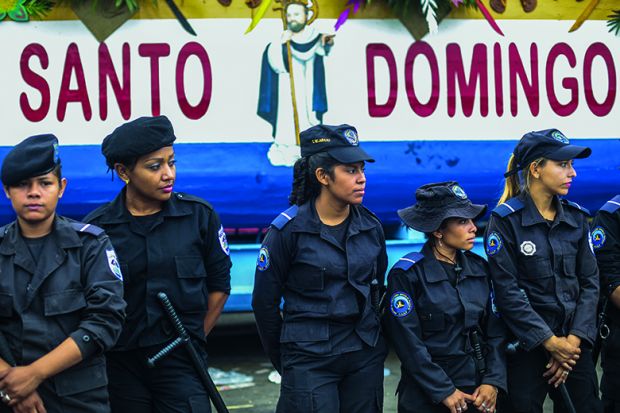Nicaragua has shut down or taken over nearly half of its higher education providers in the past two years, with academics believing that they are being “punished” for perceived opposition to the government of Daniel Ortega.
The ruling regime has confiscated the assets of and closed at least 27 institutions since 2021, with the latest target being the Nicaragua branch of the Costa Rica-headquartered Central American Institute of Business Administration (INCAE). Last month the authorities froze its assets, took over its Managua campus and declared the institution illegal by citing financial reporting issues.
Enrique Bolaños, INCAE’s rector, said that the government had resisted the institution’s attempts to submit audited accounts. “We submitted them, but they wouldn’t accept them. They always said something was missing,” he said.
Mr Bolaños speculated that the government’s hostility may have been retribution for its decision to host a dialogue between the ruling party and key opposition leaders in 2018. “I believe Nicaragua will be hurt more than INCAE will be hurt,” he said.
INCAE, which was set up by Harvard Business School nearly 60 years ago, had gradually moved more of its activities online and to Costa Rica over the past two years in response to political uncertainty and coronavirus lockdowns in Nicaragua.
In August, a prestigious Jesuit university, the University of Central America (UCA), was closed down after being accused of being a “centre for terrorism”. Although Mr Ortega’s government has targeted religious and non-religious institutions, it has been strong-handed against the Catholic church, and it appears that UCA – which with 8,000 on roll served 4 per cent of Nicaragua’s higher education students – was caught up in this.
Estela Rivero, co-director of the Central America Research Alliance and a senior researcher at the University of Notre Dame, said this “crusade” could be explained by the church “being vocal against the regime’s repressions and curtailing of civil liberties”.
Dr Rivero said that many UCA academics had started to flee the country even before the institution’s closure, following attacks on their work or fear of the same. As early as 2019, budget cuts from the government had left the university on a shaky ground financially.
Having taken control of the UCA campus, the government renamed it Casimiro Sotelo Montenegro National University, after a Sandinista student leader assassinated in 1967. Mr Ortega represents the Sandinista National Liberation Front Party.
More than a nationalisation of UCA, this “implies controlling the narratives, fields of study, research, and syllabus being imparted”, Dr Rivero said. Former staff and student institutional emails have been shut down.
A former UCA scholar who has since fled the country, who asked to remain anonymous, said there was “a collective mourning” for the fate of the university, describing it as one of the “last spaces left in Nicaragua to envision a different Nicaragua, one of freedom and democracy”.
The future of education in the country was heading towards blocking the spread of knowledge or “obscurantism”, she said.
Register to continue
Why register?
- Registration is free and only takes a moment
- Once registered, you can read 3 articles a month
- Sign up for our newsletter
Subscribe
Or subscribe for unlimited access to:
- Unlimited access to news, views, insights & reviews
- Digital editions
- Digital access to THE’s university and college rankings analysis
Already registered or a current subscriber? Login








